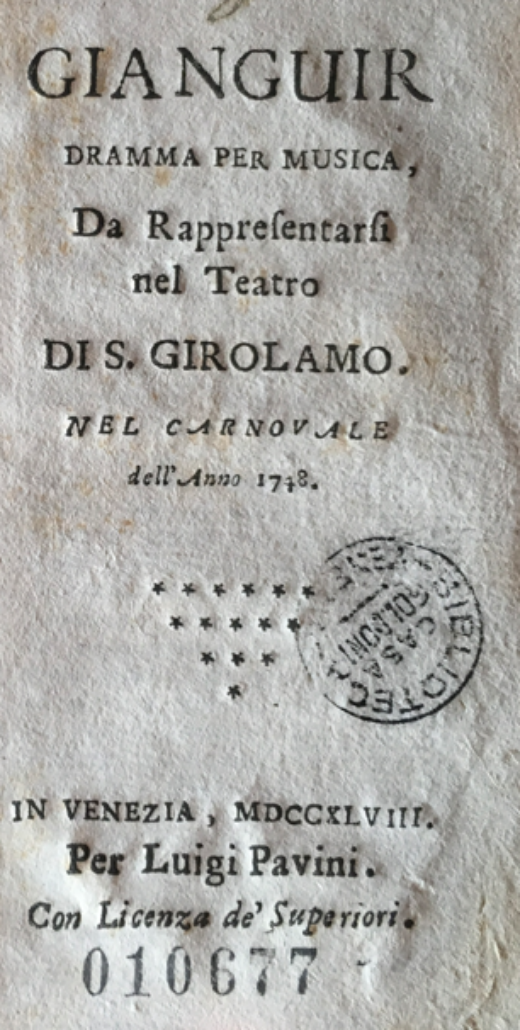
Printed
78 pages
Author(s)
Gianguir
To add to his family’s prestige, Angelo Maria Labia had a small stately theatre, the Teatro di San Girolamo, built in his palace on the Cannaregio canal in Venice; this was a miniature version of the Teatro San Giovanni Grisostomo. The theatre showed precious fabrics and materials, and the stages and scenery were moved by very intricate gears and machinery. The musicians, set designers and costume designers were among the most prestigious of the city. Gianguir was performed during the Carnival of 1748. Labia employed the same staff which had worked on Lo Starnuto d’Ercole and Eurimedonte e Timocleone. Apostolo Zeno’s libretto (written in 1724 in Vienna for Caldara and performed several times already at the Teatro San Cassiano in Venice in 1728) was shortened to three acts and set to music by Geminiano Giacomello. The play was performed with costumes by Natale Canziani, a famous costume designer for regular theatres. Although Tommaso Cassani is not mentioned, the spectacular scenery which he created for previous shows was used again here. Labia had the libretti printed in in-24 for his guests. After Gianguir, the Labia theatre stopped putting on performances, as they became too expensive.
The play unfolds in a military setting, but also in the gardens of the Agra Fort. The audience is shown several spectacular scenes, such as a military parade, a choir of soldiers or the sultan’s victory.
A father and his son struggle for power
Gianguir rebelled against his father and was disowned: he lost his right to the throne, which is now promised to his son Cosrovio. Gianguir married Zama, a woman of humble birth who convinced him to marry her daughter Miraca to Cosrovio. Her brother Asaf is the sultan’s favourite. Cosrovio turns down this proposal because he is in love with Alinda (the princess Semira, Gianguir’s sworn enemy); she convinces him to reclaim the throne bequeathed by his grandfather and take up arms against his father. His friend Mahobet, the captain of the guards, tries to remind him of his duty. Cosrovio and Asaf fight before Gianguir’s eyes. To avenge himself after being humiliated, Asaf tells Semira that Cosrovio will marry Miraca; she promises him her love out of jealousy.
When ordered to either marry Miraca or to surrender and die, Cosrovio takes up arms: Gianguir finds out about this betrayal and demands that Mahobet’s head be brought to him for having helped his son. Mahobet saves himself by taking Gianguir hostage. He is accused of high treason and Gianguir deprives him of his rank, even though Agra is in danger. The army is handed to Asaf. Semira, using the name Alinda, feigns cooperation: she promises that she will marry Asaf and denounces the enemies of the kingdom to set herself free.
Gianguir tells Cosrovio that Alinda is in love with another man. Cosrovio thinks that she has betrayed him, but as soon as Alinda is free, she reveals that Semira will not keep the promises made by Alinda, and that she is Cosrovio’s wife. The two lovers reunite. Semira sends her future husband to the battlefield and Asaf is defeated: when all seems lost for the king, Gianguir arrives—Mahobet has freed him. Zama tries to convince him to forgive his son, and Mahobet says that a rebellion will start if he kills him. At the very last moment, Gianguir chooses to be magnanimous: Semira walks in on the father and son reconciling. She asks to be killed at the same time as her husband, but Gianguir spares them on Zama’s advice. He declares her sultan’s wife and marries Semira and Cosrovio. The choir celebrates this beautiful day.
First performance
Teatro di San Girolamo
Publications and translations
Gianguir. Venezia: Luigi Pavini, 1748
